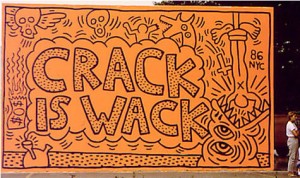Every Tuesday night after leaving my 559 social media class, I transit my way home with the same frustrated taste in my mouth. Social media – collaboration – super cool! But how in the hell can we get libraries to use these tools in creative, meaningful ways?

This past Tuesday, as I was standing on a crowded bus, defeated by frustrated mental block, I pulled out my phone and opened a game called Trivia Crack. It’s a trivia question game, in which players must achieve trophies in 6 different question categories before their opponent. The game has the option to operate through Facebook, so players can challenge people on their friend lists. As another option, you can choose a random opponent, and be faced with an Internet stranger located anywhere in the world. There is another feature called Question Factory. This feature allows players to submit, rate, and translate questions that are used in gameplay. There are also trophy prizes for player’s with a large amount of successful submissions.

It’s funny, but it took me about five minutes of playing to realize that an app like Trivia Crack is a great collaboration tool, and one that I think could be used in academic libraries.
Here’s the pitch:

UBC Libraries promote a student-wide trivia contest using Trivia Crack, and run the contest through their Facebook page. Students could sign up for the contest by friending the UBC Library and joining the trivia group. The contest would be a single elimination bracket tournament, with one round of games happening everyday until there’s a single winner. Give the winner a print card and some cookies as a prize. Boom.
 +
+ 
Using a bracket tournament will mean that the UBC Library Facebook page will have to post updated brackets each day, which will encourage users to visit the page on a daily basis as well. During the days that the tournament is happening, the UBC Library could make an effort to post fairly frequently, with the aim to attract contest users to other aspects of the page.
The ultimate goal, I think of an academic library using social media would be to have its users engaging with one another, with the library, and with other libraries, with the profile page as an arena of facilitation. In this way, users could begin to play a role in the formation of the library’s physical and virtual environment.

The problem: Time! Money!


The solution: Students!

Each library at UBC has a budget to hire student assistants through Work Learn. Having worked as a student assistant for several years, I understand that there is a fair amount of time spent on trivial tasks, such as ensuring that book spines are flush with the edges of their shelves. If the library were to utilize Work Learn funding to hire a student to manage social media, this could really open the opportunity for a positive and meaningful impact on the library’s relationship with its users.
Problem # 2: Reluctance!

Solution # 2 : Fight the Power! (non-violently)

In order for an idea like this to be applied, the Powers That Be would have to want it, and it seems like in most cases they don’t. However, there are many examples of libraries using social media in fantastic ways, and maybe with cases studies and a concrete plan presented by a charismatic voice, the times may start a-changin’.
I nominate Samuel L. Jackson to present.

I like your idea Nick. But quick question. How often would the library host these tournaments? The tournaments need to be held almost every week. In my opinion, libraries do not struggle to retain customers but fail horribly in attracting new ones therefore you need to host as many tournaments as possible every month. Additionally how would you market this idea? You can try to post this event on a library’s page but with little visitors you may have some issues. Are you simply relying on word of mouth. Just wondering… Cheers
Good questions. To start fielding these, the first thing to keep in mind is that academic libraries aren’t attracting new customers — students at some point will need to use a library. The point of this is to attract students to interact with the library on social a media platform. In terms of the frequency, the tournaments, in my mind (this is all theoretical), would span almost a month as there would only be a game a day. In terms of Attracting people, QR scan codes on posters around campus would be a good way, but appointing the student to work with social media advertising would utilize all social media, word of mouth, and any other creative outlets. Again, this is all theory, but in terms of actually incoporatinf social media in libraries, I think having someone who is really proficient in social media marketing working with libraries to attract userbase interaction is a step in the right direction.
I’ve enjoyed reading your post and I think its interesting how a game such as trivia crack can be used as a strategy for social engagement between the library and students in an academic environment. I also think that affordances, such as the question factory, does indeed provide opportunities for additional user participation, as you said they can “submit, rate and translate questions” and trophies as print cards or cookies are also given as incentives. It would definitely be interesting to see the library adopt this model to increase collaboration and competition on their social media platforms.